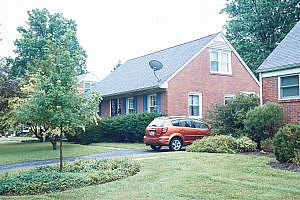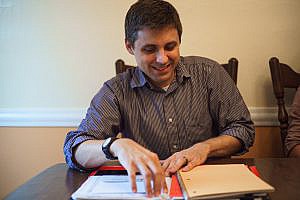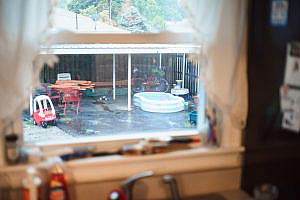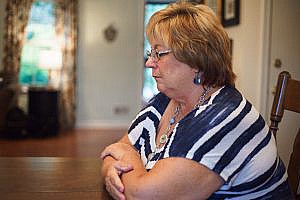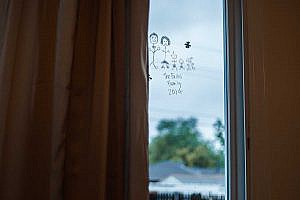The bookcases in his living room are arranged nice and neat, one for literature, one for non-fiction. Book spines show titles such as Where Is God When It Hurts?, Surprised by Truth, The Meaning of Jesus. The name of Jesus occurs strikingly often. Jason likes the profound: books,history, religion. And his own family. Framed pictures adorn the wall and show him, the 32 year-old with his wife Dana and their two children. On some of the pictures Jason has a beard that has now gone.
In college, he was one of the “computer guys”, Jason observes laughingly. At that time he also had become interested in genealogy. While others of his age played basketball or baseball, he spent time in the library to gather information about the story of his family.
His great-grandfather, Ludwig Fuchs (1888-1924), a woodcutter, arrived in Louisville as a young man in 1910. Soon after, he married a Mary Gyr, perhaps a relative? Ludwig’s mother had also been a Gyr. Calling himself Louis in his new life in America, Ludwig died in 1924. He left behind his wife and seven children. One of them was Jason’s grandfather Albert (1921 - 2004).
Mary Angela Mudd Fuchs, Jason’s mother, says that neither her father-in-law, Albert Fuchs, nor her husband, John Louis, born in 1955, ever had close ties with Louisville’s Swiss community. Earlier, one had occasionally gone to the “Swiss Picnics” or to Swiss dances. Perhaps Albert had also been a member of local associations. Eventually, all stopped attending events.
Except for names and dates, Jason could actually find out but little about his great-grandfather and his origin. Jason thinks that his early death had lead to a permanent break between his family and the Swiss homeland. No pictures adorn the walls of Jason’s house that would show energetic forebears proudly peering out, and there are neither letters, nor postcards.
In 2014, Jason converted to Catholicism. He had grown up Baptist. His mother explains that she, as well as her husband, had grown up Catholic, and as a child she hadn’t even known that there were other denominations besides Catholicism. For her “Baptist” was a synonym for foreigner, she says, and laughs. But some time ago, her husband had stopped attending church, while she and the children went to the Baptist Church.
Jason finds that his interest in history and genealogy and his religious belief are linked. “I like the feeling of being part of something ancient and large”, he states. He tells, for instance, with enthusiasm about a trip to Scotland where even newer parts of towns were older than the so-called “old towns” in America. He would like to visit the monastery in Einsiedeln, as he had read that it was over a thousand years old.
Like him, Jason’s wife Dana also converted to Catholicism. He had to urge her on though, until she was convinced and ready for it. During our visit she was with the children and her mother in the park. Like him, she also had been born and raised in Louisville. And there, his family wants to stay. There, it has its roots. “Louisville is a nice place to live”, Jason says, “and if one was born there, one was going to stay.”

